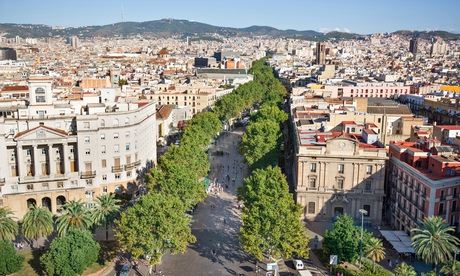
They boast magnificent city views, proximity to shopping and nightlife and the chance to live like a local.
But what some of the Barcelona properties listed for rent on Airbnb don't have, at least according to the government of Catalonia, is legality. The regional government announced on Monday that it was slapping a €30,000 (£24,000) fine on the website over what it calls a "serious" breach of local laws.
Founded in 2008, Airbnb now lists more than half a million private properties in 192 countries for stays as short as one night and is valued at an estimated $10bn. Catalonia has figured prominently in its growth, with Barcelona consistently ranking as one of the site's largest markets, and the company launched a Catalan version of its website last April.
The fine – the San Francisco-based firm's first in Europe – was for breaching local laws that state any flat rented to tourists must be registered with the Tourism Registry of Catalonia. Regional laws also prohibit the renting out of rooms in private residences.
Airbnb was one of eight letting sites fined by the Catalan government, but its success has made it the focus of widespread opposition to private tourist lets in Barcelona, where recent years have seen hundreds of thousands of private lets are on offer to cater to a growing number of tourists. Hoteliers have taken aim at the flats over what they deem unfair competition; while several neighbourhood associations blame private lets for driving up housing prices in central districts.
As tourists bypass hotels to trek into residential apartments, it puts locals in the uncomfortable position of playing neighbour to an ever-changing roster of tourists, said Reme Gómez, of the Barrí Gòtic neighbours association in Barcelona's Gothic quarter. "People are making money and the rest of us are paying for it."
Her organisation has spent the past 10 years calling for a complete ban on private tourist lets. In that same time Gómez has watched many of the apartments in her own building become tourist flats. "In many cases the flats are used as a place to party," she said. Rowdy drunkenness aside, there's an inherent conflict between the schedules of locals, who often work and have children, and those of tourists, she added.
"Tourist flats oblige the rest of us to live in a hotel, but without any of the same conditions," she said. "If you're in a hotel and it's 2am and the other guests are being too loud or vomiting in the stairwell, you can call someone to deal with it. Here no."
Fed up and left with no other recourse, many of her neighbours have moved to less touristy areas, she lamented. "We're part of what they're selling, but they're destroying it."
Not everyone in the city agrees. Last week 200 Airbnb hosts in Barcelona took to the streets to defend their right to rent out their property, arguing that they offer the chance to earn extra income.
A recent study commissioned by Airbnb found that 75% of the site's hosts in Barcelona earn equal or less than the average income for Catalonia. More than half of the hosts interviewed said that the supplemental income from Airbnb helped keep them in their homes.
The study also calculated that the site generated €128m in activity in Barcelona and helped spread that wealth across the city by pushing tourists into more diverse neighbourhoods.
On Monday, Airbnb expressed its disappointment in the Catalan government's decision. "Barcelona should stay on the cutting edge of innovation," the company said in a statement, adding that the government's decision to issue a fine "will hold the city back".
The company is considering its legal options, but promised to continue working with policymakers in Barcelona and Catalonia "to develop sensible rules that ensure people can share the home in which they live".
The fine against Airbnb is the Catalan's government's second shakedown on the sharing economy in recent months – in June it announced fines of up to €6,000 for drivers who use the ride-sharing app Uber.

